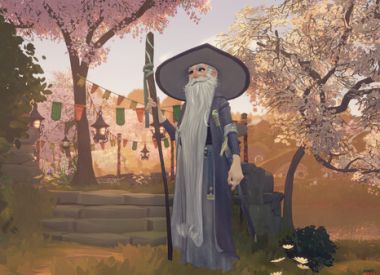Marccus Ehren has been an avid gamer all his life, but there’s one thing he came to realize was missing in even his favorite games. It wasn’t an issue of gameplay mechanics, functionality or even plot. It was simply the authentic, fully-realized presence of people like him.
“In nearly every game I played, there was no one like me, and no one like my friends. Almost no one was non-white, and certainly no one was gay,” Marccus notes.
His upcoming game Eldet is described as “a medieval fantasy themed visual novel with emphasis on LGBT characters and people of color” on its wildly successful Kickstarter page. The game’s fundraiser is currently at $22,176 pledged out of a $7000 goal. But far more important than the numbers on the side of the page is Eldet’s central tenet that “diversity matters. ”
That’s not a meaningless set of buzzwords for Marccus, but a philosophy the indie game developer fully stands behind. While Marccus has spent a lifetime gaming – he lists Mass Effect 2, Gears of War 3 and Dark Souls as massive influences for Eldet – he decided not to spend a lifetime waiting for the representation he wanted.
“Even if there were stories that included Black or Asian or Latino people, their stories were always reduced to some stereotypical caricature of what it meant to belong to those groups. Same with gay media—the character’s stories always had a tragic ending or revolved around self hate and bigotry—plus, even there, there was little to no non-white representation. I got tired of it, so I wanted to do something different,” Marccus told iDigitalTimes.
Marccus’ gaming influences inspired Eldet’s aesthetic, story and tone. Gears of War 3 “was the first game I’d ever played that seamlessly included people of color into its cast without making their involvement in the story revolve around their race and the density of representation was also much higher than in most games,” Marccus said.
As for Mass Effect 2, Marccus considers it “one of the best games of all time in terms of crafting a compelling story and giving the player everything they could ask for.” Dark Soul’s influence is felt most strongly “in terms of considering the aesthetic and tone you want for your game and really nailing it.”
The visual novel format lends a lot of weight to writing, and for Eldet, that means “the meat of the plot and the lore of the world” can be unraveled and connected in a myriad of ways, much like all that simmers beneath the surface in Dark Souls. “That’s had a huge impact on how I’ve gone about writing Eldet’s story. Players will be able to get most of the game if they really think about the details presented to them,” Marccus said.
These are lofty inspirations, especially since Marccus is the sole person behind Eldet and is making the game in his spare time. “Making the game” means every aspect of Eldet, including digital painting, music, writing, coding and animation.
“Finding the time is often a sacrifice. Development for the game began during my last semester of college, and essentially that meant that I spent all of my time outside of class working on the game. On average I spend about eight-10 hours a day on game related work, but this is what I want to be doing, so it never really feels like work,” Marccus said. “I just knew that it would be important to be able to swap from writing to art to programming to be able to make adjustments based on what was and wasn’t possible, so I buckled down and learned what I had to.”
Eldet’s success on Kickstarter took Marccus by surprise, but he’s already making plans on where that money should go.
“I’d like to be able to purchase more instruments so I can begin composing songs with more than just cello and flute. Sound design is also something that I feel is really important in video games, so buying access to sound libraries, as well as buying recording equipment, is something I’ll be doing moving forward,” he said.
Eldet has an overwhelmingly positive reception so far. “People really seem to understand what I’m trying to do with the game and they appreciate the fact that someone’s putting effort into having genuine representation,” Marccus said. The hunger for meaningful representation is as real on the part of those backing the project as it was for Marccus in creating Eldet, a passion that showed in the speed Eldet was funded.
“The minimum goal was met in just over one day, and now, three days after that, the minimum has been doubled. I was astonished, because I thought that I’d just barely make my minimum funding by the end of the month,” Marccus said.
Marccus looks forward to creating more visual novels after Eldet’s release, currently projected for September 2017.
“The visual novel format is one I really enjoy, because I feel that what sets games apart lately is the strength of the story… The visual novel format gets right into the story and keeps it there, because there isn’t much room to do anything else. It also forces you to cut out content that isn’t really captivating, so the end product ends up being tighter and well focused,” he said.
You can find out more about Eldet on the game’s Kickstarter page here (there is still over a week to throw your hat in the ring of over 800 backers), as well as on its Tumblr page here. You can also play the Eldet demo by downloading it via Google Drive or Mediafire.


















